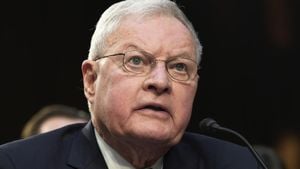Across the globe, energy infrastructure development plans are gaining momentum, reflecting nations' commitments to sustainability and energy security. From Tajikistan to Indonesia, leaders are announcing ambitious projects aimed at enhancing their countries' energy capacities and diversifying their energy sources to meet growing demands and climate goals.
For example, during the recent 28th World Investment Conference held in Saudi Arabia, Daler Juma, Tajikistan's Minister of Energy and Water Resources, unveiled plans to boost the country's power generation capacity to 10 gigawatts (GW) by 2030. This ambitious goal is outlined within Tajikistan's National Development Strategy and hinges on the innovative "10/10/10/10 Concept". This strategy aims not only to achieve the targeted capacity but also to significantly increase electricity exports and decrease waste through improved energy efficiency.
Currently, Tajikistan’s energy infrastructure boasts a capacity of 5.757 GW, primarily from hydroelectric plants, underscoring the country’s reliance on renewable resources. By making the shift to diversify its energy sources—including solar and wind—Tajikistan is taking steps to align with global trends favoring greener energies.
Turning our attention to Southeast Asia, Indonesia is drawing considerable international attention with its plans to pivot away from fossil fuels. At the G20 summit held recently, Indonesian President Prabowo Subianto announced the country’s formidable goal to retire all fossil fuel plants within 15 years. He pledged to expand renewable energy capacity by over 75 gigawatts, leveraging Indonesia's rich geothermal, solar, and wind resources.
Subianto's commitment to achieving net-zero emissions by 2050, accelerated from the previous target, has been met with both enthusiasm and skepticism from environmentalists and experts alike. While Indonesia is one of the largest coal producers globally—operationalizing over 250 coal-fired plants—the potential for renewable energy remains largely untapped, with only about 14.5 percent of its renewable potential currently utilized. Underpinning these developments is Indonesia's Just Energy Transition Partnership (JETP) agreement, which aims to draw significant investments required for transitioning to renewable energy.
Although the intentions are clear, challenges abound. For example, the geographical mismatch between renewable energy sources and industrial hubs complicates the transition. Nonetheless, Indonesia's state electric utility has revealed progress through plans for developing advanced energy grids to improve reliability.
On the investment side, there is another notable shift occurring with the United Arab Emirates (UAE) positioning itself as a key player in global energy markets. The state-owned Abu Dhabi National Oil Company (ADNOC) announced it is set to create XRG, a new investment company focused on international natural gas, chemicals, and low-carbon energy by early next year. With plans to double its assets' value over the next decade, the UAE is strategically leveraging its oil wealth to diversify its economy.
ADNOC's CEO Sultan Al Jaber has declared gas as a cleaner alternative to cater to rising energy demands across Asia and Africa. This approach aligns with the company’s broader strategy to pivot toward lower-carbon solutions and clean energy, echoing the sentiments voiced by many nations aiming for sustainability.
This kickstarting of the clean energy transition is underlined by increasing global demands for chemicals and liquid natural gas (LNG), with projections estimating significant rises by 2050. ADNOC's focus on establishing itself as one of the top global chemical producers parallels Saudi Arabia's efforts to repurpose hydrocarbons for the creation of valuable materials like plastics, highlighting the interconnectedness of energy and manufacturing sectors.
These international efforts paint a picture of resilience and adaptation as countries respond to the urgent need for energy security and environmental sustainability. With energy demands projected to soar, the message is clear: nations are not just consumers of energy; they are also proactive players orchestrated to innovate and meet future challenges head-on.
Notably, as nations reel from past over-reliance on fossil fuels, they are now obligated to reinvent their energy narratives. The global dialogue is shifting from merely consuming energy to responsibly transitioning to renewable sources. The outline of energy infrastructure development is important to watch, not only for its economic impact but also for its contributions toward global climate goals.



